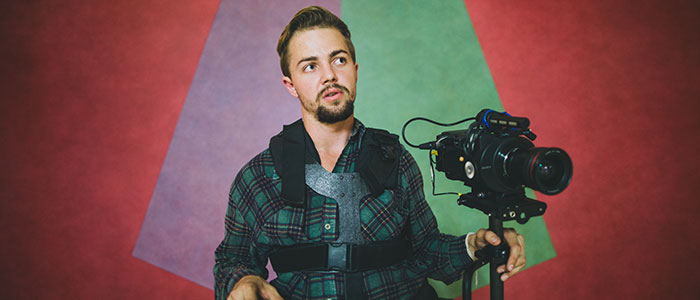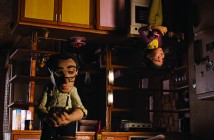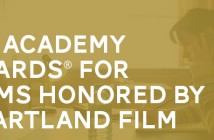Andrew Ellis creates films that highlight injustice and challenge stereotypes through intimate storytelling with award-winning cinematography. His documentary Figure Father grapples with the emotional challenges of reentry from prison, while his quirky comedic portrait documentary Eleanor Ambos Interiors flips ageism and gender stereotypes on their head. As Andrew’s films tour the film festival circuit he remains committed to film education, teaching cinematography at New York University and creating a film education program for a non-profit in Southern California that works with undocumented immigrants. Andrew’s latest film They Came at Night combines stylized fiction filmmaking with a concrete social change strategy for communities devastated by war in central Africa. Andrew is now the fulltime Director of Photography for Mediastorm, a digital storytelling agency based in Brooklyn. He also co- founded the collective Nomadique. He lives in Brooklyn, NY.
HFF: What is your film about, and how did the project come to be?
AE: They Came at Night is a narrative fictional short drama that tells the story of an abducted LRA child soldier, how he risks his life to escape, and how a nearby community puts their own pain aside to help him come home. This story is based on 190 interviews Lindsay Branham conducted in central Africa with survivors of Lord’s Resistance Army violence. The men, women and children in DR Congo, Central African Republic and South Sudan shared their experiences of loss and survival as well as their unified desire for peace inspired this story. The Lord’s Resistance Army (LRA) is currently perpetrating Africa’s longest running war. But it can end. And this film illustrates how the most basic human choices can help end it.
They Came at Night is currently being used in Mobile Cinema screenings in Africa and is also being shown to western audiences. We wanted to build off of the success of our initial evidence-based Mobile Cinema program from 2012 developed with Harvard Humanitarian Initiative and Queens University, Belfast and partnered with San Diego-based Invisible Children to develop a film and intervention that dismantles the LRA from within – to reduce the LRA’s numbers and bring the region closer to peace.
They Came at Night is the film being used in this intervention. Screenings began in the Congo in October, 2013 and have continued over the last year. At a particular screening last month someone was yelling at the screen, saying he could never forgive the LRA, but by the end of the day, after seeing the film, his attitude completely changed. He said, “Before the film I would have never accepted the LRA if they came out of the bush, because I only thought about what the LRA did. But now, after seeing the film, I have changed my mind – and now I understand that accepting the LRA will bring peace.”
This is all due to the hard work of our regional partners who are leading these workshops and conducting these screenings. Cognitive change is possible when cognitive dissonance has a chance to take place, and people’s old perceptions are challenged by new perceptions which makes room for new thought, which hopefully leads to new behavior. And in this case, the behavior we are hoping to see is peaceful reception of LRA combatants who decide to surrender.
HFF: What was your role in the production?
AE: I am the creator and producer.
HFF: Why did you submit to the Heartland Film Festival? Have you been to the Festival before?
AE: Heartland is an incredible festival and I have filmmaker friends who have had a fantastic experience at Heartland. So we are thrilled to be an official selection!
HFF: This year’s tagline is “Shift Your Perspective” – what lasting effect will your film have on moviegoers?
AE: This film will radically open moviegoers perspectives, minds and hearts to a conflict in Africa and how the most basic human choices can have a profound impact in our families, communities and world. Our film was actually created for an African audience not an American one, so as a moviegoer, watching our film requires a perspective shift to actually step into the framework of why this film even exists. And it exists to be part of ending a war. That is perspective altering.
How do we use a piece of media to be a part of ending a war? It’s an unbelievably complex and huge undertaking, and it’s a hypothesis. We’re trying to do something really new and different, but in a really thoughtful, sensitive, careful, methodological way that protects people, mitigates risk and can be evaluated and proven. I think that’s the hardest thing: is this going to work? And furthermore, how do we measure that? But these are the questions that matter and ones we are answering as the program has rolled out.
HFF: What has inspired you to become a filmmaker?
AE: I am a journalist by background but a humanitarian first and foremost. Being a filmmaker just made the most sense to create the most impact. I was mid-interview with 17 year-old Francois who had been a child soldier for most of his teenage years in the eastern region of the Democratic Republic of Congo (DRC). This boy had been forced to fight, witnessed violence and walked amongst the dead. By day, he said, he was haunted by memories of life on the frontlines. And even though he was finally home, he said he faced exclusion and rejection from his community. He said he felt like a foreigner in his own home, a stranger amongst family, and a separateness that he could not figure out how to transcend. He then paused, his eyes revealing the isolation he described. “But if other children could understand what I had gone through,” Francois said, “they would accept me.”
And as I sat there, camera in hand, I realized I had missed it, and now here it was. Could stigma and rejection dissolve through understanding and identification? Could his own story be the tool that would build a bridge back into the family he longed for? Francois’s question became the inciting moment for Mobile Cinema and “They Came at Night.” I went on to northeastern DRC where Kony’s Lord’s Resistance Army (LRA) had left an indelible mark of violence and pain across an enormous geographical region, and where children just like Francois hoped for acceptance once they came back home from abduction.
I now believe that telling your story is not just important, it is potent. It can become an agent of healing that can even transcend a history of violence. I am watching it happen in central Africa where people are bravely deciding to forgive instead of foster bitterness, to accept instead of reject, because peace is impossible unless they do.
HFF: What is something that you know about filmmaking now but you weren’t told when you started your career?
AE: How much time it really takes to make and complete a film, and how it will take every ounce of your energy, creativity and resources. But it will be so very worth it.
HFF: What are some of your favorite movies? What’s your favorite worst movie (you know it’s bad, but still love it)?
AE: I absolutely love Short Term 12, which came out last year. My favorite worst movie is definitely Titanic. Although is that really a worst movie?
HFF: How many film festivals has your film been a part of? What do you like the most about the festival experience?
AE: We have been a part of four festivals so far and it has been such a wonderful experience. The film community are people with so much heart and guts – I love it. And festivals bring together such a fantastic group – both the creators of films and the lovers of films. It is such a treat to have a dedicated time just for the medium we have spent our lives on. To meet people just as obsessed with film as us and dedicated to pushing the envelope creatively and artistically is a true gift.
HFF: Heartland Film Festival moviegoers love filmmaker Q&As. Let’s say a Festival attendee wants to earn some brownie points—what is a question that you’d love to answer, but haven’t yet been asked?
AE: Can film change the world? How?
See They Came at Night in Shorts Program 9/An Ashortment of Sorts at the 2014 Heartland Film Festival:
- Saturday, Oct. 18 – 5:45 p.m. at AMC Castleton Square 14
- Tuesday, Oct. 21 – 2:45 p.m. at AMC Castleton Square 14
- Thursday, Oct. 23 – 2:15 p.m. at AMC Traders Point Showplace 12
- Saturday, Oct. 25 – 10:15 a.m. at AMC Traders Point Showplace 12




